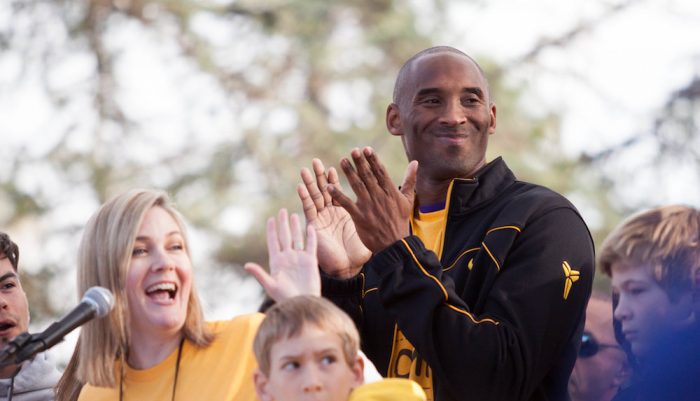*Editor’s Note: Disagree with a dear reader’s opinion? Share your perspective here.
For another perspective, “How I feel about Kobe,” by Waylon Lewis.
~
I watched in shock as news stories flooded social media and network television.
Kobe Bryant and his daughter, along with seven other people, died tragically in a helicopter crash. A famous athlete, someone fans remember for his remarkable prowess on the basketball court, someone his loved ones remember as a father, husband, friend, someone who was “giving back” and “advocating for women in sports”…was gone in the blink of an eye.
And then the angry comments poured in. One editor from Elephant Journal posted a question, “How should Kobe be remembered? Rapist or basketball star?” which ignited a firestorm of backlash, but also galvanized support within a community sexual assault survivors and those who can’t simply forgive and forget the “blemish” on Kobe’s personal history. All questions are valid, though the phrasing of this question could have been better.
What most of us failed to acknowledge during the “wind tunnel” of reader comments and reactionary op-ed pieces by writers choosing to berate anyone who raised questions about Kobe Bryant’s legacy is this:
Rape is rape. Rape isn’t a “mistake” or a “complexity of one’s past” or a “flaw” or a “shadow.” It’s not “complicated.” It’s not “water under the bridge.” It can’t be compared with other, previous human foibles or transgressions. It’s rape, and statistically, guess what? Men rape. They rape women, and men, and boys, and girls. They rape a lot. Rape isn’t something that just “happens.” Rape is something that men (most often) execute too often without consequences, and the way we discuss it matters. “She was raped,” and “He raped her,” hold two entirely different viewpoints.
Kobe’s death sparked my own, mixed, feelings. As a survivor of sexual assault, someone who is continuing to heal 45 years after something that changed me in ways immeasurable, I was mostly disgusted that so many men and women are willing to scrub the record regarding what happened in 2003.
A famous basketball player (allegedly) raped a woman. It was duly handled and manipulated by his well-paid lawyers, and then he went on to win back his wife, win at life, and win more championships on the court. Seemingly, prior to his death, Mr. Bryant was winning on the most important court of all—that of public opinion.
In a recent article called, “Dear White Women,” by Martin Mandela Morrow for Medium, the author states, “a lot of black men in particular don’t have the types of heroes that you all are keen to accept.” While I agree with some of his key points, I also take exception with some of what I think he’s trying to articulate. Stating that Malcolm X committed burglaries, Dr. Martin Luther King Jr. cheated on his wife, and Michael Jordan gambled creates harmful false equivalencies. Not all crimes are equal.
Racial injustice and anti-black male sentiment is rampant in our racist society, that’s for sure, and I agree with him on almost everything he writes in his article, but damn it, rape is rape. Sexual assault and violence against women perpetrated by men is about male culture, not male color.
A well-known man dies tragically, and suddenly he’s a hero? Let’s remember he was an elite athlete who got more than his fair share of free passes, including getting away with an alleged rape. He was a talented basketball player, yes. Sounds like he was a wonderful father. It appears as though he was doing some good things in the world. He was definitely a human being, trying to “do better and be better,” but sorry, he was not a “hero” to all and should not be remembered solely as such.
We can grieve his death, and the death of his daughter, but the good he’s done does not cancel the allegation. We all want to pretend it didn’t happen, but it did.
If we’re going to talk about Kobe, we need to talk about his whole life—not just the parts we liked. A person can be a present-time philanthropist, and also a past predator. Yes, they can co-exist.
As a white woman, I will not write fluffy words and pretend to understand Martin Morrow’s struggle as a black man, but he, in turn, shouldn’t pretend to understand mine. As Evette Dionne said in her piece “How to Discuss Kobe Bryant’s Death by Being Honest About His Life” for Time Magazine:
“…we as a culture bury these allegations and will use his death as an excuse to not have a conversation…when we’re wedded to specific narratives of how feminists should act, it can be all too easy to disregard humanity. But feminism, at least the tradition I follow, makes space for redemption too. Only Bryant’s accuser can decide if she forgives him, and it’s not our place to do that work publicly on her behalf. What we can do is complicate these conversations so we can usher in more honesty about who’s elevated in the aftermath of a sexual assault and how fame and money insulate perpetrators from being brought to account…”
I agree.
The dominating “reader comment” argument online seems to be that women impulsively and falsely accuse men of sexual assault. To that I simply say: men rape and lie about it a million times more than women erroneously report it. Because it was 2003, I went back and read through all the information surrounding this case. The evidence was overwhelming and legitimate.
>> She reported it and sought medical attention.
>> She was hushed and “the incident” was swept away.
>> He denied it at first. Then he lied about it and called it “adultery.”
>> He changed his perception of the events often, while hers remained the same.
>> He apologized for engaging in non-consensual sex, which is the very definition of rape.
>> She had bruises and lacerations on her body.
>> She was shamed and bullied after reporting her rape (as most women are), and then a powerful man with money and a following was able to walk away from his “mistake.”
If his basketball career and philanthropy since retirement matters, shouldn’t her voice and the voice of sexual assault survivors all over the world matter too? We can “like” Kobe and remember the good, but we can’t sweep away his past and merely call it “complicated.” We can’t employ selective memory just because we want to remember a famous athlete a certain way.
Rape is rape.
It’s not an asterisk in Wikipedia. It’s about power and entitlement. It’s about not taking no for an answer. It’s about holding a woman down and strangling her, penetrating her, and then muffling her voice and lying about it. It’s about threatening her and warning her not to tell anybody. It’s about calling it adultery and casting doubt so that more women stay quiet because they know they will not be believed. It’s about publicly calling her truth a “story” instead of a first-person account. It’s not about the racial divide.
Kobe knew what he did. That’s why he later acknowledged that the sex he had with a young woman in a hotel room was, in her view, non-consensual (also known as rape). He apologized so that he could distance himself from it and make it go away and let it disintegrate inside the steaming pile of all the other composted things we collectively choose to forget about the people we idolize.







Read 10 comments and reply